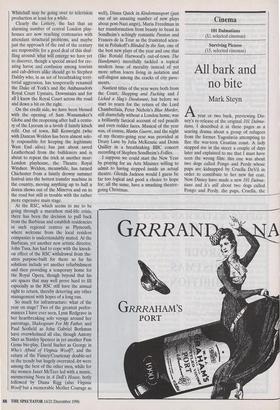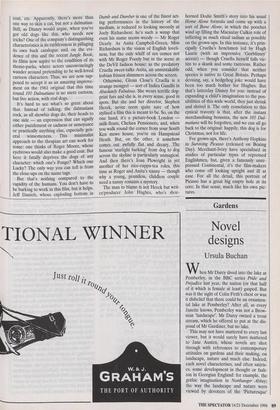Cinema
101 Dalmatians (U, selected cinemas) Surviving Picasso (15, selected cinemas)
All bark and no bite
Mark Steyn
Ayear or two back, previewing Dis- ney's re-release of the original 101 Dalma- tians, I described it in these pages as a searing drama about a group of refugees from the former Yugoslavia attempting to flee the war-torn Croatian coast. A lady stopped me in the street a couple of days later and explained to me that I must have seen the wrong film: this one was about two dogs called Pongo and Perdy whose pups are kidnapped by Cruella DeVil in order to contribute to her new fur coat. Now Disney have made a new 101 Dalma- tians and it's still about two dogs called Pongo and Perdy, the pups, Cruella, the coat, etc. Apparently, there's more than one way to skin a cat, but not a dalmatian. Still, as Disney would argue, when you've got old dogs like this, who needs new tricks? One of the company's distinguishing characteristics is its ruthlessness in pillaging its own back catalogue and, on the evi- dence of this and the recent Jungle Book, its films now aspire to the condition of its theme-parks, where actors unconvincingly wander around pretending to be well-loved cartoon characters. Thus, we are now sup- posed to accept it as an amazing improve- ment on the 1961 original that this time round 101 Dalmatians is no mere cartoon, but live action, with real dogs. It's hard to see what's so great about that. Instead of talking, the dalmatians cock, as all showbiz dogs do, their heads to one side — an expression that can signify either puzzlement or sadness or annoyance or practically anything else, especially gen- eral winsomeness. This minimalist approach to the thespian art can work for some: one thinks of Roger Moore, whose eyebrows would also make a good coat. But here it fatally deprives the dogs of any character: which one's Pongo? Which one Lucky? The only way you can tell is from the close-ups on the name tags. But that's nothing compared to the vapidity of the humans. You don't have to be barking to work in this film, but it helps. Jeff Daniels, whose exploding bottom in Dumb and Dumber is one of the finest act- ing performances in the history of the medium, is reduced to looking moonily at Joely Richardson: he's such a wimp that even his name seems weedy — Mr Roger Dearly. As Anita Campbell-Green, Miss Richardson is the vision of English loveli- ness, but the only whiff of sex comes not with Mr Roger Poorly but in the scene at the DeVil fashion house: as the predatory Cruella sweet-talks Anita, an unmistakable lesbian frisson shimmers across the screen.
Otherwise, Glenn Close's Cruella is a strange mongrel — sort of Indira Gandhi in Absolutely Fabulous. She wears terrific dog- print furs and she is, in every sense, good in spots. But she and her director, Stephen Herek, nevea seem quite sure of how stylised a film this is meant to be. So, on the one hand, it's a picture-book London — milk-floats, Chelsea Pensioners, and, when you walk round the corner from your South Ken mews house, you're on Hampstead Heath. But, on the other, it somehow comes out awfully flat and dreary. The famous 'starlight barking' from dog to dog across the skyline is particularly unmagical. And then there's Joan Plowright in yet another of her nice-cuppa-tea roles, this time as Roger and Anita's nanny — though why a young, penniless, childless couple need a nanny remains a mystery.
The man to blame is not Herek but writ- er/producer John Hughes, who's shoe- horned Dodie Smith's story into his usual Home Alone formula and come up with a sort of Bone Alone, in which the pooches wind up filling the Macaulay Culkin role of inflicting as much ritual sadism as possible on the grown-ups. In this instance, it's prin- cipally Cruella's henchmen led by Hugh Laurie (with an impressive `Gorblimey' accent) — though Cruella herself falls vic- tim to a skunk and some raccoons. Rather odd, when you consider that neither species is native to Great Britain. Perhaps devising, say, a hedgehog joke would have been too much bother for Hughes. But that's latterday Disney for you: instead of expanding a child's imagination to the pos- sibilities of this wide world, they just shrink and shrivel it. The only consolation to this cynical travesty is that, after the instant merchandising bonanza, the new 101 Dal- matians will be forgotten, and we can all go back to the original: happily, this dog is for Christmas, not for life.
For grown-ups, there's Anthony Hopkins in Surviving Picasso (released on Boxing Day). Merchant-Ivory have specialised in studies of particular types of repressed Englishmen, but, given a famously unre- pressed Continental, it's the film-makers who come off looking uptight and ill at ease. For all the detail, this portrait of Picasso has a great big empty hole at its core. In that sense, much like his own pic- tures.



















































































































 Previous page
Previous page